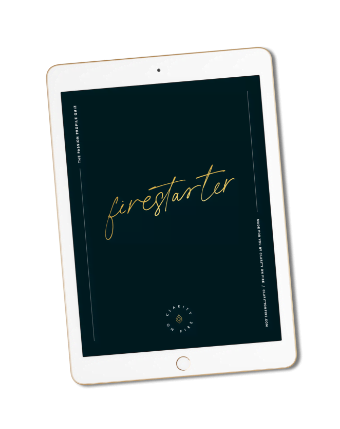Let me tell you a story about my client, Amber (this is not her actual name, of course).
Amber has one of those loathsome jobs that we’ve all probably had at one point: The kind that involves a 1.5 hour commute (one way!), an hourly pay that way undervalues her worth, work that doesn’t challenge her intellect at all, and an unpredictable, callous boss.
On top of the hectic commute, the low pay, the mind-numbing work, and the grating boss, Amber and her spouse are in the process of building a house, which requires piles and piles of decision-making at a rapid pace.
A couple of weeks ago, she got incredibly honest with me (and herself) and said …
“The stress and overwhelm were getting so bad that I realized I’d been starting to look forward a little too much to my evening wine. And I don’t want to be someone who numbs out to avoid my stress. That’s not a road I want to go down. So, I’ve decided I’m not going to drink any alcohol at all during the work week.”
Amber’s honesty lead to one of the best conversations I’ve ever had with a client, but not for the reason you think.
I TOLD HER THAT IT WASN’T GOING TO WORK
Let me be abundantly clear when I say that Amber’s awareness of her habits and her desire to not numb out is awesome. And I told her so.
What’s not so awesome is the “all or nothing” approach to dealing with the habit.
How often have all of us done the exact same thing?
We’re annoyed at the fact that we don’t exercise, so we say, “I’m going to start running 5 times per week. No exceptions.”
We’ve heard that meditation is good for us, so we’re like, “I’m going to meditate every day for a month!”
We hate our job, and we want a new one, so we decide, “I’m going to apply to one job per day until I get a new one.”
We’re not thrilled with our eating habits, so we declare, “No fast food, no desserts, no candy, and I’m going to keep a record of everything I eat.”
We reach a point of being so fed up with what we’re doing (or not doing), that we automatically bounce to the other extreme, thinking it will make us feel better.
But here’s the (slightly twisted) truth of the matter …
GOING TO THE OTHER EXTREME IS A CONVENIENT WAY OF IGNORING THE REAL PROBLEM
Working out like a maniac, or dieting like a fiend, or applying to jobs with militant consistency, or (in Amber’s case) giving up all alcohol during the work week might make you feel good about yourself for a few weeks, but the truth is, it’s a temporary distraction from dealing with what’s causing your all-or-nothing fervor.
When I asked Amber where the stress that caused the wine drinking came from, she told me, “I feel like I have to get everything right. The house, my work, pleasing my boss, exercising, looking for new jobs. There’s SO much pressure right now to do everything perfectly.”
Bingo.
She could give up all the wine she wanted, but that wasn’t going to change the constant pressure to be perfect that weighed on her every day.
THIS “ALL-OR-NOTHING” MENTALITY ROBS US OF OUR POWER TO MAKE CHOICES
Rigid structure is the perfect avoidance mechanism.
It makes us feel like we’re getting something done. We get to feel accomplished and proud of ourselves, while simultaneously not having to “go there” when it comes to the deeper issues. It’s a win-win! (Albeit a pretty screwy one.)
And even better (or rather, worse) is that when we swing from one extreme to another, we get to completely opt out of making decisions, or even thinking about our behavior.
When Amber got through a big day of house planning with the builder, she really wanted to mark the occasion with a glass of champagne with her husband.
But she couldn’t, because she’d already made a “no weekday drinking” rule.
I asked her, “Well, what was the intention behind your desire for champagne? Was it stress or celebration?”
What came next was a big “aha moment” for her. She realized that no, this particular desire was truly celebratory and joyful; it wasn’t about numbing out and avoiding the stress in her life.
There’s nothing wrong with celebratory champagne. There is something wrong with using wine to avoid dealing with your stress.
And like Amber did, when you make blanket, “all-or-nothing” rules for yourself …
Your forfeit your power to make decisions in the moment based on your intention.
DON’T GET ME WRONG, THIS IS DIFFICULT
Most people are all too happy to opt-out of having to make decisions in the moment, based on their intentions, because it’s strenuous.
It’s much easier to numb out with the help of rigid rules than it is to stop and ask, “Why am I really doing this? Is my intention good, or not-so-good?”
(I should say, it’s difficult in the present to stop and question your intentions. It’s much harder way down the road, when you’re trying to change your habits after years of refusing to examine why they’re there, in the first place.)
Amber and I did a lot of coaching around the pressure to be perfect that was causing her stress (and motivating her affinity for wine), and she’s been able to release a lot of that stress by changing her belief about what “perfection” really means.
Yeah, it was momentarily uncomfortable to “go there,” but now that she’s done it she’s experiencing something she certainly wasn’t before: The relief of getting to release the huge burden of perfection, and the power to make decisions in the moment instead of falling back on all-or-nothing “rules” that ignored the real problem.
![]() “All” is not a remedy for “nothing,” & structure is often the perfect avoidance mechanism.
“All” is not a remedy for “nothing,” & structure is often the perfect avoidance mechanism.
So, are you willing to “go there,” too, and stop using structure to avoid what’s really going on? We’d love to know.
Much Love,
Rachel (+ Kristen)



Letting go of perfectionism is one of my greatest takeaways from coaching! I felt so much relief after “going there” and examining the root causes of my habits to truly understanding the meaning behind them. Perfectionism and living through the ideals of other people/society are both hard to let go of but I have been able to make space for so many more impactful and meaningful areas of my life to expand and flourish during the process. Great post!
“Making space” is really what it’s all about, isn’t it?? And we can attest to all of the space you’ve made! 😉
While on my way to take my kids to the skate park, I was beating myself up for not being more rigid about my schedule during this week when they are out of school. I was wondering, what stops me from making a decision about child care, putting myself in the spot where I almost give away all of my work time for time with the kids. In truth, I will be working from 2-9 tonight with my clients and team. It’s almost a full work day. So often I think that if I don’t work every second I can that I’m allowing myself to be distracted, which would ruin my perfection. This post helped me appreciate how I am able to keep with my intention by making decisions as they come so everyone wins.
Love your statement about “making decisions as they come so everyone wins.” It’s definitely harder to do, in the moment, but you’re right … everyone ends up winning FAR more often when we operate that way. Glad you got something out of this post, Haven!
This one was excellent – y’all’s best yet. 🙂
M
Thanks, Michael!
I do this all the time, with declarations like “I’m going to practice a yoga inversion every single morning” to “I’m giving up cold turkey my expensive latte/pastry habit to save $$”. I am going to consider the causes behind these ‘all or nothing’ statements next time I make one. Btw, a couple of pieces of advice you guys mentioned in the PPVE Money video, specifically the Money for Me account and the notion of what you buy is what you vote for/value, is helping to reduce my latte purchasing 🙂 Thanks guys!
Awesome realizations, Francine! And kudos to you for becoming even more conscious about your spending habits. Thanks for sharing your “wins” with us!